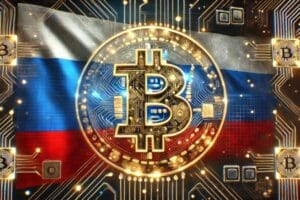The year 2024 marks a crucial moment in the history of cryptocurrencies with the decision of Russian President Vladimir Putin to legalize Bitcoin as a legal means of payment in Russia.
This move, discussed for a long time and finally realized, has sparked mixed reactions around the world, attracting the attention of economists, investors, and governments.
A context of global changes: Putin’s choice for Bitcoin in Russia
Putin’s decision comes at a time of great economic and political turmoil globally. The war in Ukraine, international sanctions, and rising inflation have pushed many countries to seek alternatives to traditional financial systems.
Russia, in particular, has seen its economic system under pressure due to sanctions imposed by the United States and the European Union. In this context, the adoption of Bitcoin represents an attempt to diversify funding sources and create new opportunities for international trade.
Elvira Nabiullina, the governor of the Central Bank of Russia, announced that the legalization of Bitcoin is not only about domestic use but also international payments.
According to Nabiullina, Bitcoin and other cryptocurrencies could offer a solution for cross-border transactions, bypassing the restrictions imposed by international sanctions.
The Central Bank has therefore adopted a more open and collaborative approach towards cryptocurrencies, while maintaining a certain level of regulation to prevent illicit activities such as money laundering and the financing of terrorism.
Economic implications, financial implications, and international relations
The adoption of Bitcoin in Russia will have several economic and financial implications. On one hand, it could attract new foreign investments, interested in taking advantage of the opportunities offered by an emerging criptovalute market.
On the other hand, it could increase the volatility of the Russian financial markets, already afflicted by geopolitical and economic uncertainties.
Experts are divided on the potential long-term consequences. Some argue that the legalization of Bitcoin could strengthen the Russian economy, offering an alternative to traditional financial channels and improving the country’s resilience in the face of sanctions. Others warn that the adoption of cryptocurrencies could expose Russia to new risks, including dependence on a highly volatile market and the possibility of attracting criminal activities.
Putin’s decision has sparked mixed reactions at the international level. In the United States and the European Union, many politicians and regulators have expressed concern about the security implications and the potential use of cryptocurrencies to evade sanctions.
However, some countries, particularly those with more fragile financial systems, might follow the Russian example, seeing in cryptocurrencies a way out of the constraints imposed by traditional financial institutions.
The legalization of Bitcoin in Russia represents a new chapter in the history of cryptocurrencies. Since their creation, cryptocurrencies have promised to revolutionize the global financial system, offering secure, anonymous, and borderless transactions.
However, their adoption has been slow and hindered by concerns regarding security and regulation.
With Putin’s decision, Russia joins a growing number of countries that are exploring the potential of cryptocurrencies.
Although many uncertainties and challenges remain, the adoption of Bitcoin in Russia could mark a turning point, pushing other countries to reconsider their positions and paving the way for a future where cryptocurrencies play a central role in the global economy.
Conclusion
The legalization of Bitcoin in Russia under the leadership of Vladimir Putin is a historic event that could have profound implications for the global economy. While the world watches closely, it remains to be seen how this decision will influence the future of cryptocurrencies and whether it will truly bring the hoped-for benefits to the Russian economy.
In any case, the step taken by Putin represents a courageous attempt to adapt and thrive in a rapidly changing world.


